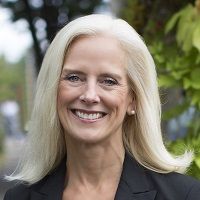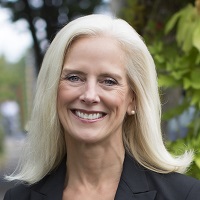Women and Money: Three Ways to Plan for the Future as Life Happens
Childcare, divorce and aging parents can all take a toll on a woman’s financial security, but planning ahead, becoming financially literate and staying proactive can help.


Profit and prosper with the best of Kiplinger's advice on investing, taxes, retirement, personal finance and much more. Delivered daily. Enter your email in the box and click Sign Me Up.
You are now subscribed
Your newsletter sign-up was successful
Want to add more newsletters?

Delivered daily
Kiplinger Today
Profit and prosper with the best of Kiplinger's advice on investing, taxes, retirement, personal finance and much more delivered daily. Smart money moves start here.

Sent five days a week
Kiplinger A Step Ahead
Get practical help to make better financial decisions in your everyday life, from spending to savings on top deals.

Delivered daily
Kiplinger Closing Bell
Get today's biggest financial and investing headlines delivered to your inbox every day the U.S. stock market is open.

Sent twice a week
Kiplinger Adviser Intel
Financial pros across the country share best practices and fresh tactics to preserve and grow your wealth.

Delivered weekly
Kiplinger Tax Tips
Trim your federal and state tax bills with practical tax-planning and tax-cutting strategies.

Sent twice a week
Kiplinger Retirement Tips
Your twice-a-week guide to planning and enjoying a financially secure and richly rewarding retirement

Sent bimonthly.
Kiplinger Adviser Angle
Insights for advisers, wealth managers and other financial professionals.

Sent twice a week
Kiplinger Investing Weekly
Your twice-a-week roundup of promising stocks, funds, companies and industries you should consider, ones you should avoid, and why.

Sent weekly for six weeks
Kiplinger Invest for Retirement
Your step-by-step six-part series on how to invest for retirement, from devising a successful strategy to exactly which investments to choose.
Life often throws us curveballs, but as women, we face a specific set of challenges that often have a less significant impact for our male counterparts. These include navigating childcare challenges, supporting aging parents and handling changes in marital status via divorce or death of a spouse. These family matters have a direct impact on women’s lives, as well as their careers and finances, and balancing these demands with building long-term wealth can be an arduous task.
I encourage my clients and peers to face these challenges for women and money head-on. Here’s what I recommend:
1. Proper planning allows for flexibility as career and family obligations shift.
Women are often tasked with caregiving obligations, and recent research shows that 62% of women provide more than 20 hours of weekly care to children or aging parents, compared to 38% of men. This contributes greatly to the comparative gap that we see in women’s wages.
From just $107.88 $24.99 for Kiplinger Personal Finance
Become a smarter, better informed investor. Subscribe from just $107.88 $24.99, plus get up to 4 Special Issues

Sign up for Kiplinger’s Free Newsletters
Profit and prosper with the best of expert advice on investing, taxes, retirement, personal finance and more - straight to your e-mail.
Profit and prosper with the best of expert advice - straight to your e-mail.
When I was in my late 30s and my children were 2 and 4 years old, I opted to shift from my full-time role in marketing to part-time work. This was due both to lack of flexibility from my employer and the desire to spend more time with my children. I was in the fortunate position to have a supportive husband, and I had been diligently socking money away in my 401(k) plan.
I eventually decided to launch a new career as a CERTIFIED FINANCIAL PLANNER™ professional, knowing how important it is to make wise financial decisions. Taking time off from my prior career and then restarting in a new profession meant I had to work my way back up the career ladder again. It impacted my ability to save for retirement and may affect my future Social Security payments. But it also gave me precious time for my family and the opportunity to work in a career that provides me with a good income, flexibility and a lot of satisfaction from the work I do with clients.
Having a clear picture of your overall financial situation is a good starting point to be able to create a roadmap to move forward:
- Understand what you own, like your house and investments, and what you owe, including debts like mortgage and car payments.
- Understand your cash flow — what is your income and what are your expenses?
- Have a budget to stick to and a savings goal — assign a specific job to every dollar that you earn to help create your best life possible.
- Your emergency fund is essential. We recommend having about six months’ worth of essential living expenses stored away. If a life event is going to change your lifestyle significantly, you will want to make the necessary adjustments to your budget so you don’t have to pull from that emergency fund.
If a situation arises where you need to dip into your savings, there are ways to do so that would minimize the impact on your overall financial future, such as pulling from a retirement account, taking out a loan or considering another form of borrowing. It is important to look at all of your options and analyze your specific situation and needs.
2. Enhancing your financial literacy will empower your short- and long-term success.
According to the 2022 TIAA Institute-GFLEC Personal Finance Index, women with low financial literacy are five times more likely to have difficulty making ends meet and three times more likely to be debt constrained. The results of a test given by the American College of Financial Services showed that 89% of women failed in the category of retirement literacy.
Financial literacy seems to go hand-in-hand with level of experience handling money. In younger generations, women are starting to out-earn men in many areas of the world, according to a Pew Research Center analysis of Census Bureau data. That puts them in an advantageous situation to be more hands-on with managing where that money is going and learning about important financial matters that they otherwise might have to seek out education on.
Financial literacy is especially important in instances like divorce where a couple are going to be separating their financial situations. Working with clients going through divorce, I have seen situations where the family mortgage, car loan and credit cards were all in the husband’s name, so the wife had no credit score at all. Getting a mortgage or approval for any type of loan is very difficult with no proven history of credit or money management.
We try to avoid this by making sure that both halves of a couple are engaged in conversation during financial planning meetings, to ensure that both voices are being heard and needs are being met on both sides of the relationship. Post-divorce, new financial goals must be set, and it is crucial for women to write down their new goals and create a plan around them.
3. Staying proactive can help you stick to your plans.
Women are interested in crafting tangible long-term plans that they can easily visualize and that enable them to understand the risks they are taking along the way. Analyzing your overall financial picture and being sure you have a grasp of important financial literacy topics are both key to building wealth for the future.
Though women can potentially face major setbacks when it comes to saving for their future, it is still possible to take and maintain control of your financial situation by being proactive and consistent in sticking to your plan. Childcare and caring for family members are unavoidable aspects of life and won’t necessarily have a detrimental impact on your finances, if planned for and handled with diligence.
Life events that are often unexpected, like divorce or becoming a widow, can be difficult and scary, as you are stepping into unknown territory. But continuing to stay on top of prioritizing your long-term financial goals and simply having important conversations will soften any impact that a life-altering event may have for women looking to build and grow their wealth.
Marshall Financial Group, Inc (“Marshall Financial”) is an SEC-registered investment adviser with its principal place of business in Doylestown, Pennsylvania. This newsletter is limited to the dissemination of general information pertaining to Marshall Financial Group’s investment advisory services. Investing involves risk, including risk of loss. This newsletter contains certain forward‐looking statements (which may be signaled by words such as “believe,” “expect” or “anticipate”) which indicate future possibilities. Due to known and unknown risks, other uncertainties and factors, actual results may differ materially from the expectations portrayed in such forward‐looking statements. As such, there is no guarantee that the views and opinions expressed in this letter will come to pass. Additionally, this newsletter contains information derived from third party sources. Although we believe these sources to be reliable, we make no representations as to the accuracy of any information prepared by any unaffiliated third party incorporated herein, and take no responsibility, therefore. For additional information about Marshall Financial, please request our disclosure brochure as set forth on Form ADV using the contact information set forth herein, or refer to the Investment Adviser Public Disclosure website (www.adviserinfo.sec.gov). Please read the disclosure statement carefully.
Profit and prosper with the best of Kiplinger's advice on investing, taxes, retirement, personal finance and much more. Delivered daily. Enter your email in the box and click Sign Me Up.

Paula is the President of Marshall Financial Group in Doylestown, Pa., and has worked in the financial services industry for 19 years. She also serves as a Senior Wealth Advisor and specializes in helping corporate executives and women in transition make complex financial life decisions with comfort and confidence. She achieved her Bachelor’s degree from Rutgers University, Master of Science from the University of Florida and MBA from NYU Stern School of Business.
-
 How Much It Costs to Host a Super Bowl Party in 2026
How Much It Costs to Host a Super Bowl Party in 2026Hosting a Super Bowl party in 2026 could cost you. Here's a breakdown of food, drink and entertainment costs — plus ways to save.
-
 3 Reasons to Use a 5-Year CD As You Approach Retirement
3 Reasons to Use a 5-Year CD As You Approach RetirementA five-year CD can help you reach other milestones as you approach retirement.
-
 Your Adult Kids Are Doing Fine. Is It Time To Spend Some of Their Inheritance?
Your Adult Kids Are Doing Fine. Is It Time To Spend Some of Their Inheritance?If your kids are successful, do they need an inheritance? Ask yourself these four questions before passing down another dollar.
-
 The 4 Estate Planning Documents Every High-Net-Worth Family Needs (Not Just a Will)
The 4 Estate Planning Documents Every High-Net-Worth Family Needs (Not Just a Will)The key to successful estate planning for HNW families isn't just drafting these four documents, but ensuring they're current and immediately accessible.
-
 Love and Legacy: What Couples Rarely Talk About (But Should)
Love and Legacy: What Couples Rarely Talk About (But Should)Couples who talk openly about finances, including estate planning, are more likely to head into retirement joyfully. How can you get the conversation going?
-
 How to Get the Fair Value for Your Shares When You Are in the Minority Vote on a Sale of Substantially All Corporate Assets
How to Get the Fair Value for Your Shares When You Are in the Minority Vote on a Sale of Substantially All Corporate AssetsWhen a sale of substantially all corporate assets is approved by majority vote, shareholders on the losing side of the vote should understand their rights.
-
 How to Add a Pet Trust to Your Estate Plan: Don't Leave Your Best Friend to Chance
How to Add a Pet Trust to Your Estate Plan: Don't Leave Your Best Friend to ChanceAdding a pet trust to your estate plan can ensure your pets are properly looked after when you're no longer able to care for them. This is how to go about it.
-
 Want to Avoid Leaving Chaos in Your Wake? Don't Leave Behind an Outdated Estate Plan
Want to Avoid Leaving Chaos in Your Wake? Don't Leave Behind an Outdated Estate PlanAn outdated or incomplete estate plan could cause confusion for those handling your affairs at a difficult time. This guide highlights what to update and when.
-
 I'm a Financial Adviser: This Is Why I Became an Advocate for Fee-Only Financial Advice
I'm a Financial Adviser: This Is Why I Became an Advocate for Fee-Only Financial AdviceCan financial advisers who earn commissions on product sales give clients the best advice? For one professional, changing track was the clear choice.
-
 I Met With 100-Plus Advisers to Develop This Road Map for Adopting AI
I Met With 100-Plus Advisers to Develop This Road Map for Adopting AIFor financial advisers eager to embrace AI but unsure where to start, this road map will help you integrate the right tools and safeguards into your work.
-
 The Referral Revolution: How to Grow Your Business With Trust
The Referral Revolution: How to Grow Your Business With TrustYou can attract ideal clients by focusing on value and leveraging your current relationships to create a referral-based practice.